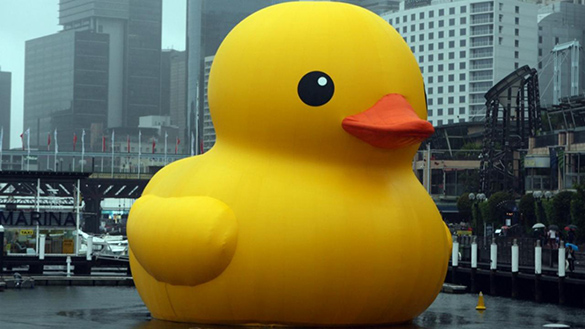Minds On
What is ‘fake news’?
Student Success
Think-Pair-Share

Have you ever been fooled by a fake picture or news story? Can you think of a time when you thought something was possible because it was on television or in a movie, only to discover that it wasn’t? How do you know when you are being presented with ‘fake news’?
Note to teachers: See your teacher guide for collaboration tools, ideas and suggestions.
Action
News: real or fake?
Press the ‘News Article’ button to examine the following news article and the accompanying picture.

In defence of the $120,000 giant inflatable rubber duck
By Graeme Bayliss - Published on Jun 01, 2017
You’ve probably heard by now that the Ontario government is putting $120,000 of grant money toward floating a colossal rubber duck into the Toronto Harbour as part of this summer’s Canada 150 festivities. If not, I’ll catch you up: it’s 13,600 kilograms of social media bait intended to draw young people to a celebration no one beyond boomers, bureaucrats, and (ahem) certain public broadcasters seem to care much about.
Naturally — this being a government project costing in excess of nothing — Tory MPPs expressed some disapprobation when the topic came up Monday at Queen’s Park. “Quack economics” is what PC deputy leader Steve Clark called it. Rick Nicholls, the party’s tourism critic, dubbed the whole thing “an absolute cluster-duck.”
How do you know if this news is real or fake? Use the following criteria to help inform your decision.
Evaluating credibility of online news or social media stories
| Yes | No | |
|---|---|---|
|
|
|
|
|
|
|
|
|
|
|
|
|
|
|
|
|
|
|
|
|
|
|
|
Professional responsibilities
As you research more about the issue of ‘fake news,’ use your new information to respond to the following questions.
- How is ‘fake news’ defined?
- What is the role or responsibility of journalists?
- Why is the role of journalists so important and respected?
- Why might it be a problem for a politician to use the term ‘fake news’?
Record your responses using a method of your choice.
Consolidation
Analyze a media text
You have learned about the problem of ‘fake news’ and its implications. Find a news article, recording, tweet, or Facebook post and use the checklist from the Action section to assess the credibility of the text. Record your analysis using a method of your choice.
In your response consider the following questions:
- Why have you chosen this text?
- Why might the producer of the text want to publish this?
- What advantages or gains are made in its publication?
- What can you find out about the source and originator of the text?
- How might different audiences react to the text?
- How might this impact how audiences react to news stories in general?
Reflection
As you read the following descriptions, select the one that best describes your current understanding of the learning in this activity. Press the corresponding button once you have made your choice.
I feel...
Now, expand on your ideas by recording your thoughts using a voice recorder, speech-to-text, or writing tool.
When you review your notes on this learning activity later, reflect on whether you would select a different description based on your further review of the material in this learning activity.